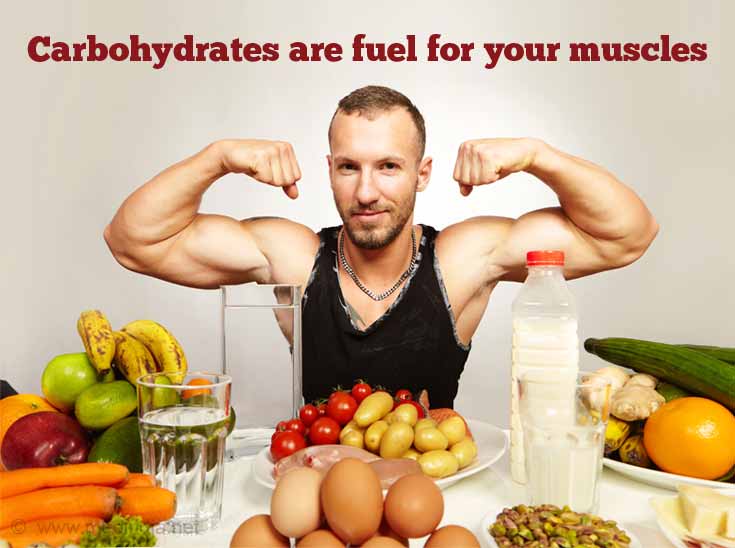- ACSM Fit Society, 2011 spring issue
- Nutrition Fact Sheet: Eating Before Exercise, Provided by Sports, Cardiovascular, and Wellness Nutrition (SCAN), a dietetic practice group of the Academy of Nutrition and Dietetics.
- Timing Your Nutrition, Christopher R. Mohr, PhD, RD, CSSD
- Preventing the "Low-Fuel Light" in Endurance Exercise, Andrea Hacker Thompson M.S., R.D.
About
Sufficient energy and an appeased stomach are keys to optimal performance while working out. The pre-exercise meal is often skipped due to lack of time and lack of awareness on what to eat. Appropriate food consumption before exercising gives the energy and strength needed to finish a workout regimen. It also guarantees that the body starts with a full tank of glycogen.
Even if one is not performing a sport in order to compete, eating foods that boost energy before a workout means being able to delay fatigue. It allows one to push harder for better performance and also to recover faster from exhaustion.
Eating right helps to:
- Exercise longer and at a higher intensity.
- Delay fatigue.
- Promote recovery.
- Help the body adapt to the stress while working out.
- Improve body composition and strength.
- Enhance concentration.
- Help maintain a healthy immune system.
- Reduce the risk of cramps and stomach aches.
Whether you are a pro athlete, a runner or a gym enthusiast; what you eat prior to exercising is linked to your level of performance.
Pre Workout Foods
Carbohydrate works as a fuel for muscles. The more stress one exerts on the muscles more carbs are needed to keep going. The importance of carbs when fueling up for a workout session is highly underestimated. It is assumed that when it comes to strength training, it’s all about protein.

protein is important for muscle building and repair, but in order to lift weights carbohydrate is needed as a prime fuel. Foods high in carbohydrates, adequate in protein and moderate in fat form the best food choices prior to an exercise regimen.
It is preferred to keep the following points in mind while choosing a pre-workout meal:
- Rich in carbohydrate to increase muscle capability.
- Easy to digest.
- Liquid meal may be preferred over a whole meal.
- Small amounts of protein to be included as it helps build and repair muscle tissue. Adequate protein before exercising could help reduce post-exercise muscle soreness.
- Low in fat and fiber to ensure optimal and easy digestion.
Pre-exercise meals that can be consumed 3-4 hours before exercising:
| Meal | Carbohydrate Source | Protein Source |
| Oats with fruit and nuts | Oats, fruits | Nuts |
| Brown rice with chicken | Rice | Chicken |
| Legumes with bread or rice | Bread / Rice | Legume |
| Bread with cheese | Bread | Cheese |
| Bread with egg | Bread | Egg |
| Toast with peanut butter and banana | Toast, banana | Peanut butter |
| Cheddar cheese with crackers and fruit | Crackers, fruit | Cheddar cheese |
| Curds / Yoghurt with fruit | Fruit | Curds / Yoghurt |
| Milk with fruit | Fruit | Milk |
| Handful of nuts and raisins | Raisins | Nuts |
| Soymilk with fruit | Fruit | Soymilk |
| Vegetable sandwich with yoghurt or milk | Bread | Yoghurt / Milk |
| Cottage cheese sandwich | Bread | Cottage cheese |
Pre-exercise meals that can be consumed 30-60 minutes before exercising:
- Sports drink
- Sports gel
- Sports bar
- Piece of granola bar
- Piece of fruit or jam sandwich
Fluid Recommendations:
- Two to four cups of fluids three to four hours before a work out
- One to two cups of fluids one hour before a work out
It is best not to eat immediately before a workout because while the muscles are under a lot of stress the stomach will also be trying to simultaneously digest food. The competing demands are a challenge for optimal performance. Eating too close to a workout can cause gastro-intestinal discomfort.

The pre exercise meal should be consumed preferably three to four hours before a strenuous workout. It should ideally comprise of 300-600 calories and should be high in carbohydrate (2-3g/kg body weight) with moderate protein. Even if one is not hungry, it is important to eat before a long workout. One has to think of it as fueling the body for an enjoyable stint. However, a small snack such as a fruit is the maximum one should consume closer to the workout.
Whether it is strength training or a run which lasts for no more than 45 minutes an ideal meal should be eaten three to four hours before the workout and a smaller snack should be consumed an hour before the session.
Protein bars
Squeezing a workout into a busy schedule, one may like the convenience of a protein or "sports bar”. It is essential to choose the right one as most bars are just candy bars, often providing extra unnecessary calories. One should preferably opt for a bar that has about 200 calories, up to 5 grams of protein and 25 grams of carbohydrate.







